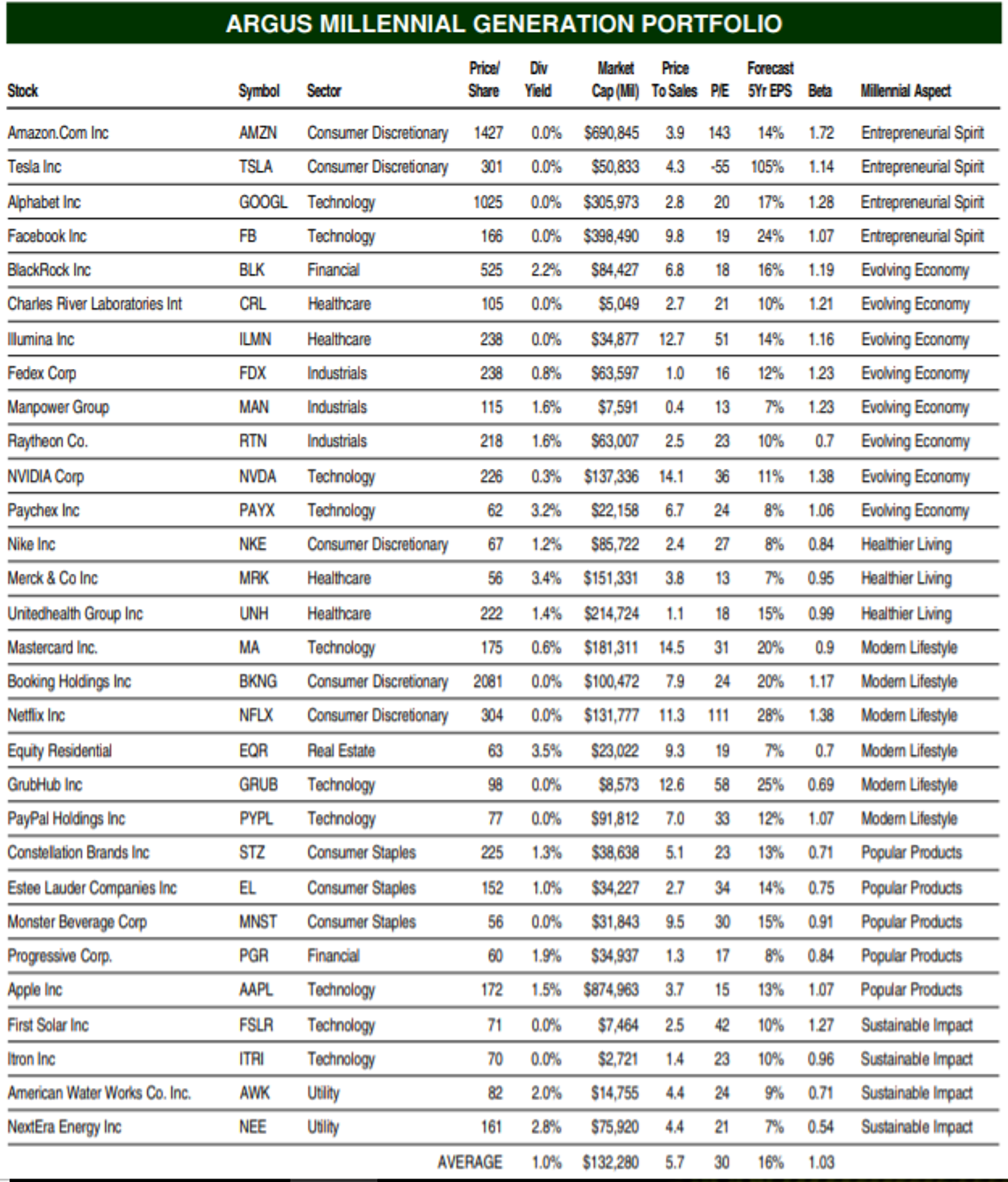A new generation of consumers – the Millennials – has recently become the largest demographic cohort in the country, explains Stephen Biggar, senior analyst with Argus Research, a leading independent Wall Street. research firm.
This group, with new lifestyle preferences and different career goals, is demanding a new menu of sustainable products and services.
DEFINING THE MILLENNIALS
There are now over 92 million Millennials, born between 1982 and 2000 and ranging in age from their late-teens to their mid-30s. Given this age spread, their purchasing power is still emerging.
According to our research, Millennials have $2.6 trillion in direct annual purchasing power, mostly representing older Millennials established in their work and families.
They have an additional $700 billion in indirect purchasing power, representing spending by their mainly Baby Boomer parents on housing, sustenance, clothing, education, healthcare and entertainment.
Millennials are already coveted by marketers, even though their annual spending is 35% below the spending levels of the generation ahead of them, Gen X, and 64% below the spending levels of the Baby Boomers.
As Millennials rise into their maturity, they will increasingly control their own spending and their earnings are expected to grow. As well, disposable income will further rise as late-20s Millennials pay off their “mountain” of student debt.
A DIFFERENT KIND OF REBELLION
The Baby Boomers, those born between 1946 and 1964, were such a mighty demographic force that they over-shadowed the follow-on “Generation X” (those born from 1964 to 1982). While there was some second-generation overlap, many Boomers competed for jobs with Gen X (rather than parented them). The biggest part of the Boomer cohort bore the children known as the Millennials.
The generations are different. Boomers, in their younger days, openly fought with their “Greatest Generation” parents over politics, race, feminism, the Vietnam War and sexual mores, among other things. But over time, their fire died down. Boomers, for all their early rebelliousness, grew up on Classic Coke and Big Macs, and never really questioned how and where their jeans and sneakers were made.
Millennials are staging a subtler, but more-sustained rebellion. They don’t decry their parents’ beliefs, mores, or tastes; they simply have not adopted them. Without the protest-march fanfare of young Boomers, Millennials have quietly extracted elements of the 1960s and 1970s countercultural ethos, including “back to the land,” “sustainable” and “green.”
SHAPING AN EVOLVING, SUSTAINABLE FUTURE
Millennials have grown up in the digital age, which has granted them insight into the real world never experienced by prior generations. Immersed in the real-time news cycle, Millennials insist that their devices and clothes come from workplaces that use resources sparingly, practice sustainability, and treat workers fairly. They are quick to find the lowest prices on the internet.
Further, much as they want to make the earth a healthier place, they are insisting on healthier fare for themselves and their children. They eat better than the Boomers, smoke less and exercise more. In short, Millennials are completely at home in the consumer economy; but they’re reshaping it to produce the goods, products, and services they want.
Millennials have been surrounded by fantastic affluence, but have also seen their middle-class parents fighting to hold onto their lifestyles.
After watching corporations discard their parents when they reach 50 or 55, Millennials more than any prior generation seek to build careers rather than earn salaries; value co-worker networks over any single job; and start their own companies with unmatched entrepreneurial zeal. They are pushing the economy to evolve.
BUILDING THE ARGUS MILLENNIAL GENERATION PORTFOLIO
The intersection of these trends – sustainability, healthier living, and an entrepreneurial spirit – has resulted in the emergence and growth of numerous companies well suited to the new generation. Many of these companies are expected to be future industry leaders and are included in the dynamic Argus Universe of Coverage.
In this report, we present our latest version of the Argus Millennial Generation portfolio. A diversified portfolio, of course, is more than just a list of companies. To build the Argus Millennial Generation Portfolio, we applied concepts such as industry diversification, balance-sheet strength and growth at a reasonable price.
For example, our portfolio includes representation in 10 of the 11 GICS sectors, with over-weights, not surprisingly, in the Technology and Consumer groups.
We note that the portfolio is not a value portfolio — the P/E ratio of 29 and the P/S ratio of 5.3 are both higher than the averages for the S&P 500. Yet for the high price, we do expect strong growth. The average five-year growth rate for the stocks in the portfolio is 16.
Meanwhile, we have taken steps to reduce risk, including the industry diversification as well as a focus on large-cap stocks (as the average market cap for the stocks in the portfolio is $127 billion). We also generate income from this portfolio: the average yield is 1.0%. The average beta is 1.03.

NEW STOCKS IN THE PORTFOLIO
We have added the following stocks to the portfolio based on our latest review:
* Mastercard Inc. (MA), which is an Evolving Economy company working on new, cashless payment
systems.
* Nike Inc. (NKE), which is a Healthier Living company, given its focus on athletic wear.
* Charles River Laboratories Inc. (CRL), which is also an Evolving Economy company that focuses on outsource R&D services to Pharmaceutical and Biotech companies.





















